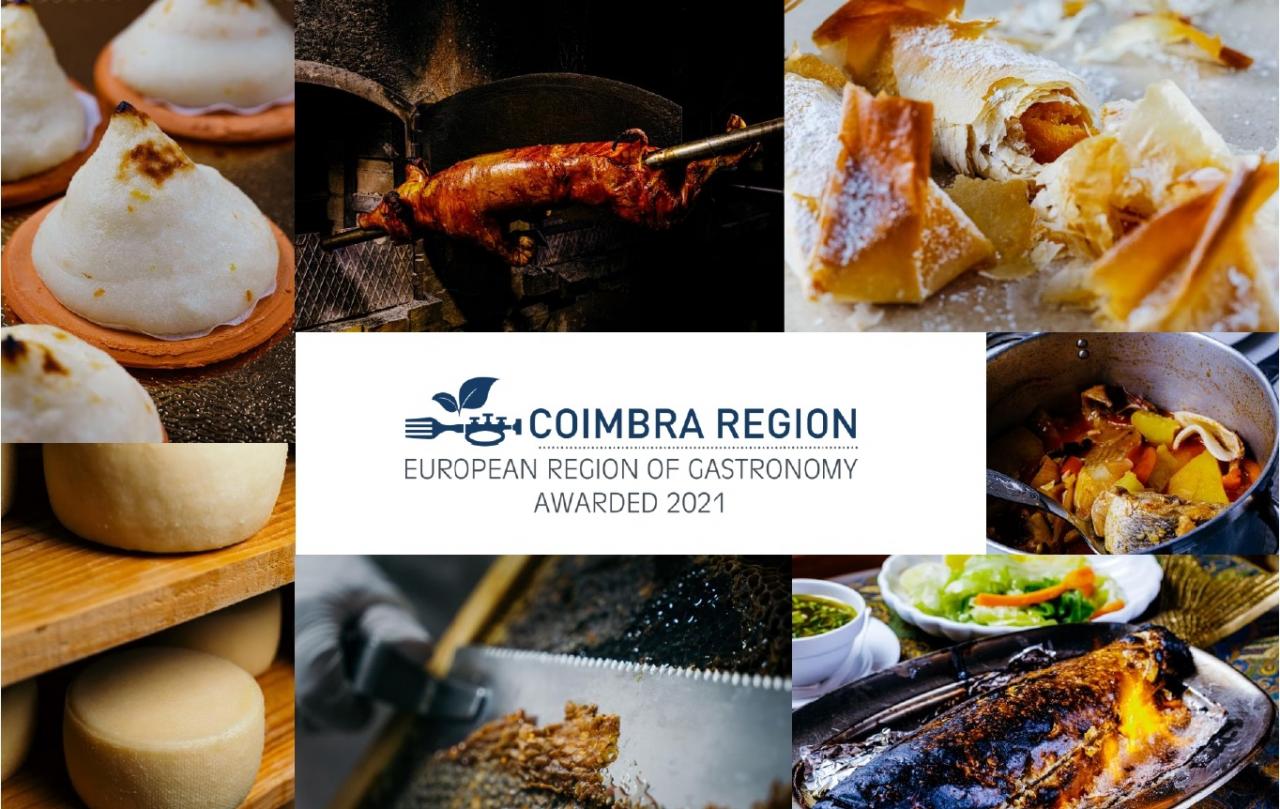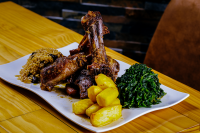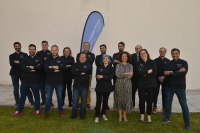
Food and its entire cycle - from breeding, to cultivation, to production, to cooking, to the table - reflect the cultural experiences and food heritage of a people and its territory. The Coimbra Region is characterised by natural and landscape diversity, the result of physical, biological and historical-cultural influences that have interacted and still interact here, designing the identity of the territory in its various aspects
One of the basic objectives of the Coimbra Region Intermunicipal Community is to optimise the sustainable development of tourism and the economic activities related to this sector by strengthening and integrating the existing resources and structures in a more organised and integrated way, encouraging and acting towards integrated planning, the creation and promotion of inter-municipal projects which unify the offer and image of the region as a quality destination to live or visit.
Basically, in the Coimbra Region we see gastronomy not just as a culinary art, but as an area of knowledge, with the potential to bring together the local dynamic, involving producers, consumers, professionals, students, amateurs and ... tourists!
Gastronomic Diversity
The tradition and preservation of our identity is common to the whole Region, reflecting a unique gastronomic diversity which complements and enriches the experience of those who visit us. The reality of the mountains contrasts with that of the coastal area and allows us to bring to the table the knowledge and flavour, whether from distant generations or from a people who developed a subsistence cuisine. The gastronomy of the Coimbra Region is vast, including river and sea fish dishes, meats and conventual sweets, which promise to please all palates.

Gastronomy is a key element and, aware of this reality, we felt it was the right moment to prepare the Coimbra Region's application for the title of "European Region of Gastronomy 2021", which involves, besides the core of founders where the University of Coimbra is included, a multidisciplinary group of organisations ranging from health, education, Local Action Groups, Cooperatives, Associations, to private individuals.
This project, on which we are working hard, is supported by a programme to develop and enhance the immense wealth of products from the Coimbra Region, which are perfect for cooking up an excellent tourist recipe, linking the territory through the excellence of its flavours and recipes, where the following stand out Chanfana, Lampantana, Duckling pig, Lamprey, Fish from the Xávega Art, Sardines from Figueira da Foz, Rice from Baixo Mondego, PDO cheeses - Rabaçal and Serra da Estrela and Conventual Confectionary.

The motto
Under the slogan "A Million Food Stories", the Coimbra Region, as the European Gastronomy Region, wants to show that, more than just the perspective of food, it is about heritage, tradition, culture and, above all, about people who tell stories and create memories that enrich the gastronomic experience.
Here, communities take on a central role, preserving what is unique and authentic in a vast territory with a geography that favours a unique diversity of endogenous products which, combined with the stories passed down from generation to generation, make the Coimbra Region a territory with a million stories to share with those who enjoy its flavours. And who doesn't like a good story?
The distinction
Underlying the distinction as European Gastronomy Region 2021-2022, is the recognition of the construction of a project that reflects the will to enhance the identity, diversity and authenticity of the territories and local communities, through narratives around gastronomy. Through this distinction, it aims to contribute to the economic and social cohesion of the Coimbra Region, through the continuous qualification of the destination, regenerating, requalifying and rehabilitating the territories with tourism potential, through its cultural and natural heritage, material and immaterial, generating notoriety, and attracting people and investment.

The common brand "European Region of Gastronomy 2021-2022" has an intrinsic guiding strategy that is anchored in the valorisation of the territory and the communities, boosting the economy and finding new solutions for environmental, economic and social sustainability.
Recognising the richness of the region's biodiversity, the strategy of the European Gastronomy Region intersects with the objectives of Food Corridors, led by the Coimbra Region, to encourage the consumption of seasonal products, respecting the production cycle, shortening the supply chain and boosting the local economy, while also contributing to healthier eating that is closer to the Mediterranean diet, offering unique experiences and memories.
We recognise the importance of sustainable practices in perpetuating resources and we want to improve planning and prevention mechanisms, protecting endogenous products and local gastronomy.
A sustainable production system, from an environmental, economic and social point of view, contributes to the enhancement of products and consumer awareness of good practices in the production, transformation and consumption of food, including studies to evaluate the impact of new products on satiety, regulating appetite and reducing obesity, as well as food safety.
This is also one of the objectives of the Food Corridors: to show young people the production cycles of endogenous products; to introduce them to local producers and put them in contact with this reality, which is sometimes not very accessible. In this way, we can contribute to "new ways of doing things", creating conditions for innovation and creativity and valuing professions and knowledge that are in danger of disappearing due to technological developments and emerging professions. The focus is on the ability to innovate, without distorting the traditional, bringing it closer to new patterns of consumption.
Follow us on this journey and unravel a million food stories!

